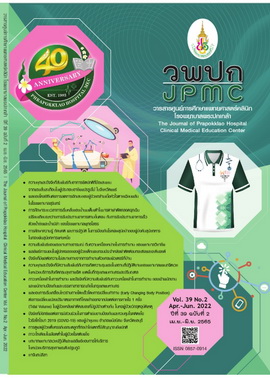Factors Influencing Community Leaders’ Participation for Prevention and Control of The Coronavirus Disease 2019 in Phanat nikhom District, Chonburi Province
Main Article Content
Abstract
BACKGROUND: Community leaders are important in prevention and control of communicable diseases by law and in practice. Therefore, their participation for disease prevention and control should be explored.
OBJECTIVES: To analyze the factors influencing community leaders’ participation in disease prevention and control of COVID-19.
METHODS: The study samples included 264 community leaders in Phanat Nikhom District, Chonburi Province; they were randomly selected by the multi-stage random sampling. The self-administered questionnaires as the research tool contained different sections including knowledge, attitude, social support, perception of disease prevention and control. The questionnaires were verified validity and reliability by three experts. The obtained data were analyzed by not only descriptive statistics but also inferential statistics with stepwise multiple linear regression analysis.
RESULTS: Most leaders had a high level in disease prevention and control (60.2%). Attitude, perceived risk, perceived severity, perceived usefulness, resource support, social support and social expectation had statistically significant positive relation with the leaders’ participation in disease prevention and control at level 0.05. The perceived social support (β= 0.32) was the factor affecting leaders’ participation in COVID-19 prevention and control implementation at the highest level. The second highest affecting factor was the perceived social expectation (β= 0.27). Both influential factors could predict the leaders’ participation in disease prevention and control at 30.3%
CONCLUSIONS: This research was revealed that the perceived social support and social expectation were influential factors to community leaders’ participation. In order to improve the efficiency in disease prevention and control, the relevant organizations should provide activities to enhance social support and improve the perceived social expectation among community leaders.
Article Details

This work is licensed under a Creative Commons Attribution-NonCommercial-NoDerivatives 4.0 International License.
References
Ilesanmi OS, Fagbule OF. Community participation: key to an improved COVID-19 response. Ann Ib Postgrad Med 2020;18:1-2.
Gilmore B, Ndejjo R, Tchetchia A, de Claro V, Mago E, Diallo AA, et al. Community engagement for COVID-19 prevention and control: a rapid evidence synthesis. BMJ Glob Health [Internet]. 2020 [cited 2021 Oct 30];5(10):e003188. Available from: https://gh.bmj.com/content/bmjgh/5/10/e003188.full.pdf
Thoyib M, Widodo W, Rohati R, Mulyadi E, Sutarman S. The relationship of community leaders and social cultural environment with community participation in management of COVID-19 in tangerand city. Linguistics and Culture Journal 2021;5(S1):1009-19.
Chonburi Provincial Public Health Office, Ministry of Public Health. Interactive dashboard in case of the coronavirus disease 2019 outbreak in Chonburi province [Internet]. 2021 [cited 2021 Nov 8]. Available from: https://cbi.hdc.moph.go.th/hdc/main/index_pk.php
Ministry of Public Health. Notification: appointment of Communicable Disease Control Officers under the Communicable Disease Act B.E. 2015, (No. 4) B.E. 2020, Ratchakitcha Royal Gazette 2020;137( Special Section 58 ง):8-9.
Thiwong S. The participation of community leaders in prevention and control of avian influenza at Huaimai Sub-District, Song District Phrae Province [dissertation]. Pathum Thani: Western University; 2018.
Lee KM, Jung K. Factors influencing the response to infectious diseases: focusing on the case of SARS and MERS in South Korea. Int J Environ Res Public Health [Internet].2019 [cited 2021 Oct 30];16:1432. Available from: https://www.mdpi.com/1660 4601/16/8/1432
Cohen J, Uphoff N. Participation’s place in rural development: Seeking clarity through specificity. World development 1980;8:213-35.
Green L, Kreuter M. Health program planning: an educational and ecological approach. 4th ed. New York: McGraw Hill; 2005.
Bloom S. Handbook on formative and summative evaluation of student learning. New York: McGraw Hill; 1971.
Best JW, Kahn JV. Research in education. 8th ed. Boston: Allyn and Bacon; 1998.
Duangdee P, Maleehual M, Krongyuth P, Boonsu T. The participation on dengue hemorrhagic fever prevention and control of people in Non-Phung sub-district, Warinchumrab district, Ubon Ratchathani province. Thai journal of public health and health science 2020;3(1):1-12.
Sribunrueng W, Ninwattana T, Sumransuk S, Anirapai K, Rugthangam S, Spiller P. Factors affecting prevention behavior of COVID-19 infection in Bangkok. Udon Thani Rajabhat University Journal of Humanities and Social Sciences 2021;10(1):195-206.
Nawsuwan K, Singweratham N, Waichompu N, Chayakul K. The successful implementation of Novel coronavirus (COVID-19) in the community of village health volunteers (VHVs) in Thailand. Princess of Naradhiwas University Journal 2020;12(3):195-212.
Katanyutanon T, Thongsiri T, Pichitchainarong A, Kingdokmai T, Thammakul S, Saenkhamrang P, et al. Factors related to COVID-19 preventive behaviors among health science students of Huachiew Chalermprakiet university. Huachiew Chalermprakiet Science and Technology Journal 2021;7(1):8–20.

